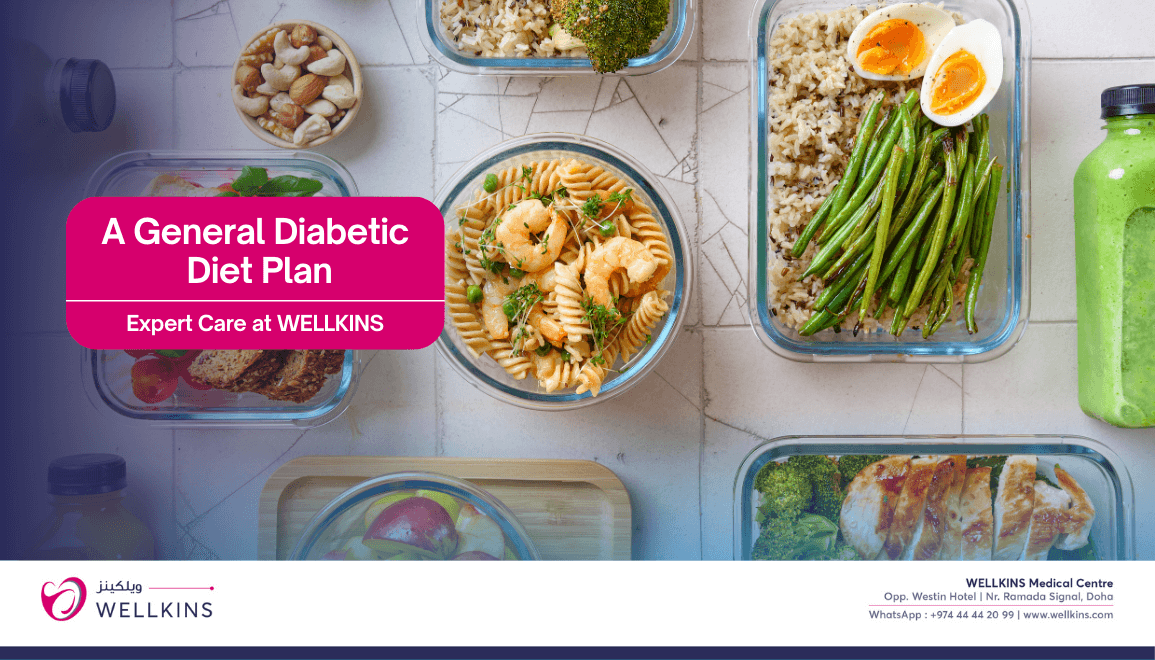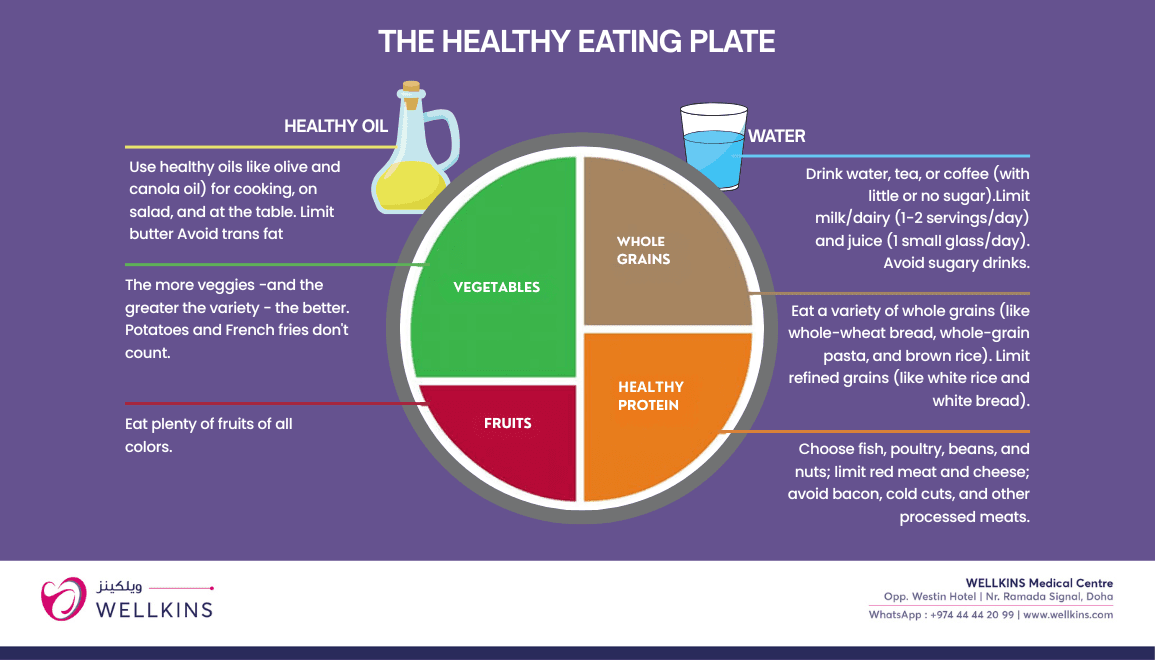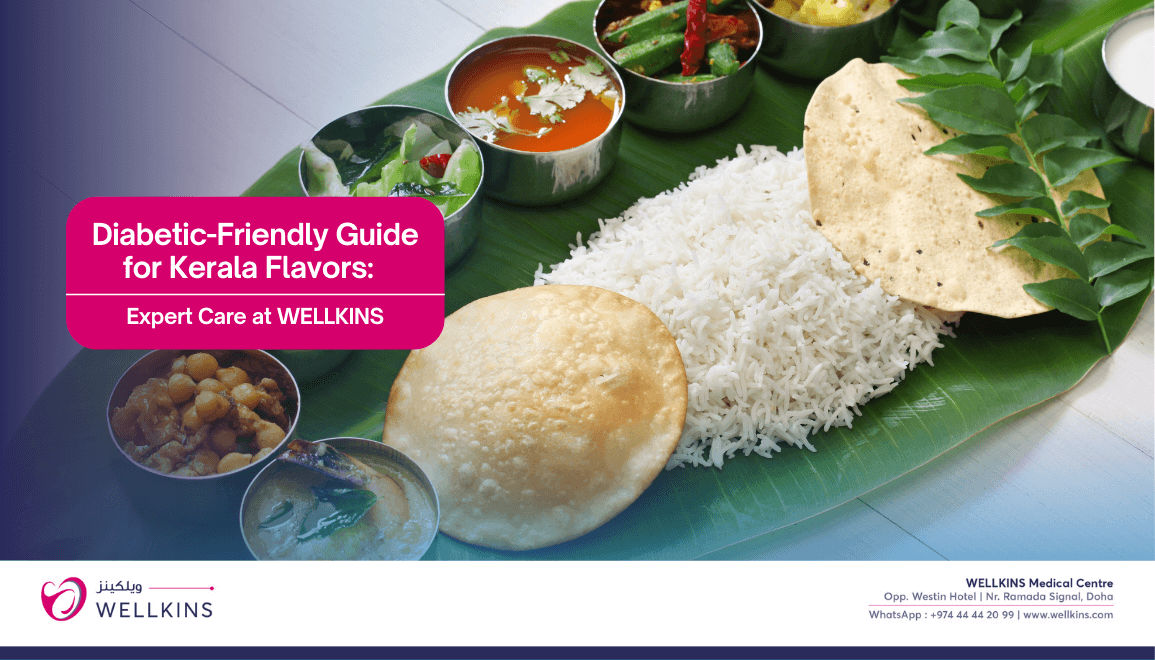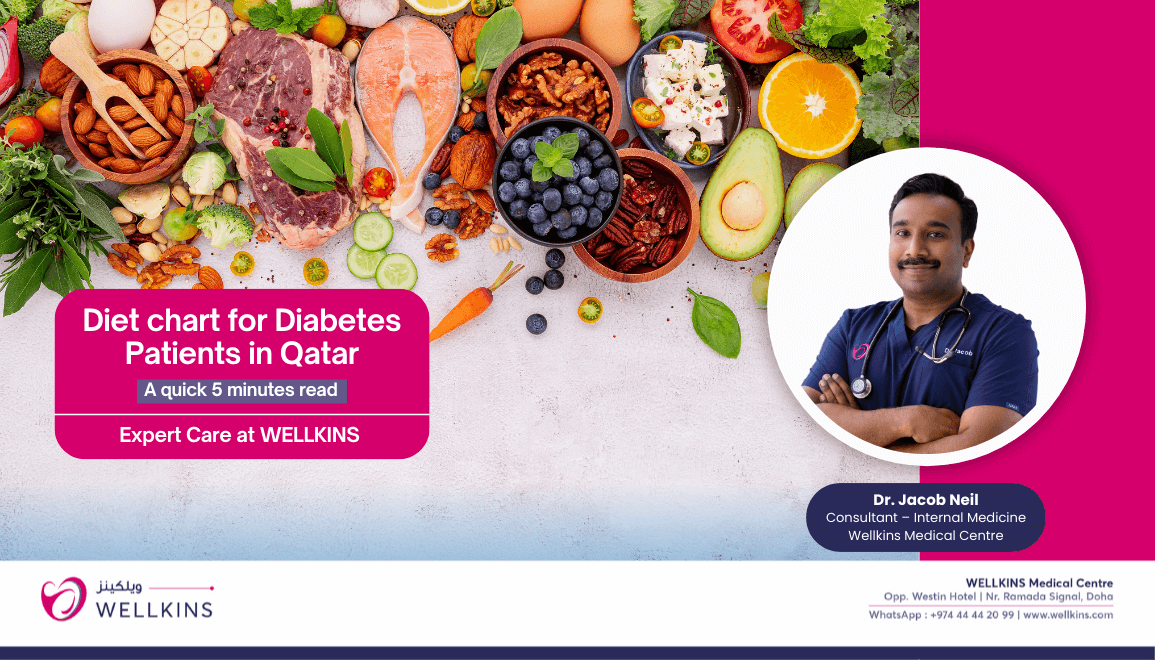Author: Dr. Jacob Neil (Consultant – Internal Medicine Wellkins Medical Centre)
Managing diabetes is a journey that requires careful attention to lifestyle, medication and most importantly, diet. For many, the thought of a “diabetic diet” conjures images of restrictive, bland meals. However, a well-structured diet plan is not about deprivation; it’s about supporting you with smart, sustainable choices that balance blood sugar control, support heart health and aid in weight management. At Wellkins Medical Centre, we believe that managing your health should be a journey toward a more vibrant life, not a limitation. Here is a complete guide to a general diabetic diet plan, along with a special section dedicated to embracing the rich flavors of Kerala cuisine in a heart-healthy way.
“Healthy management of diabetes starts with a balanced diet, but navigating a complex meal plan can be a challenge. In Qatar, finding the right dietary guidance is essential for controlling blood sugar. There’s a strong connection between the food we eat and our body’s insulin response. Therefore, a well-structured diet plan is not just about what you eat, but how you can effectively manage the long-term journey of living with diabetes.”
The Foundations of a General Diabetic Diet Plan
A successful diabetic diet focuses on balancing macronutrients carbohydrates, proteins and fats to keep your blood sugar stable throughout the day. The key is to choose nutrient dense foods that provide sustained energy without causing sharp spikes.
Key Components
- Fruits and Vegetables: Include a variety of non-starchy vegetables like broccoli and leafy greens. Opt for whole fruits over juices.
- Whole Grains: Choose fiber-rich options like whole wheat, oats, brown rice, and quinoa.
- Lean Proteins: Select lean meats (chicken, turkey), fish, eggs, beans, and lentils.
- Healthy Fats: Incorporate healthy fats from sources like olive oil, avocados, and nuts.
- Dairy: Low-fat or nonfat dairy products, like milk and yogurt, are good in moderation.
Foods to Limit
- Processed and Red Meats: Reduce your consumption of red and processed meats, which are often high in fat and salt.
- High-Sugar Foods and Drinks: Cut back on added sugars found in sugary drinks, baked goods, and other sweets.
- Refined Grains: Limit your intake of refined grains like white bread and white rice.
- Excessive Salt: Lower your salt intake to help manage blood pressure and reduce the risk of heart disease.

Your Daily Diabetes-Friendly Diet Plan:
Living with diabetes doesn’t mean you have to give up delicious food. The key is to make smart, balanced choices that help manage your blood sugar levels. A well-planned diet, combined with regular exercise, can make a huge difference in how you feel and can help you maintain a healthy lifestyle.
On Waking
- Start your day with a glass of warm water or unsweetened green tea.
- Eat 5–6 soaked almonds or walnuts.
Breakfast (Choose one)
- A vegetable omelet with one slice of whole-grain bread.
- One bowl of oats porridge with chia/flax seeds and skim milk (no sugar).
- Two multigrain chapatis with a vegetable sabzi.
- One small bowl of Greek yogurt with cucumber and tomato.
- Try to avoid fruit juice, white bread, and sugary cereals.
Mid-Morning Snack
- One small apple, pear, guava, or papaya.
- One boiled egg.
- A handful of roasted chana.
Lunch
- Base: One to two multigrain chapatis or 1/2 cup of brown rice or quinoa.
- Protein: Grilled chicken, fish, paneer, or dal (lentils).
- Vegetables: A half plate of non-starchy vegetables like spinach, green beans, okra, or broccoli.
- Salad: Cucumber, tomato, and carrot with a squeeze of lemon.
Avoid fried curries, heavy gravies, and excess rice.
Afternoon Snack
- Unsweetened tea or coffee with two sugar-free crackers.
- A handful of mixed nuts (almonds, walnuts, pistachios, pumpkin seeds).
Dinner (Keep it light)
- Two chapatis with grilled fish, chicken, or tofu and sautéed vegetables.
- A large bowl of vegetable soup with a small portion of protein.
- Grilled salmon with steamed broccoli and quinoa.
Bedtime (if you’re still hungry)
- One glass of warm, unsweetened skim milk.
- 1/2 cup of Greek yogurt.
The Role of Healthy Eating Plate

It emphasizes both food quality and proportion, starting with the foundation that half your plate should be dedicated to a colorful variety of vegetables and fruits noting specifically that potatoes and French fries are excluded due to their adverse blood sugar impact.
The remaining half of the plate is equally divided: one quarter should be whole grains (like brown rice, quinoa, and whole-wheat pasta), which have a gentler effect on blood sugar compared to refined grains. The final quarter should consist of healthy proteins, where the guidance is to prioritize fish, poultry, beans, and nuts while strictly limiting red meat and avoiding processed meats like bacon and cold cuts. Crucially, the advice extends beyond the food portions to hydration and fats: the guide stresses the importance of using healthy oils (such as olive and canola) and choosing water, tea, or coffee as main beverages, actively calling for the limitation of sugary drinks and dairy intake. Finally, the Plate serves as a constant reminder that staying active daily is a non negotiable part of achieving overall health and well being and maintaining a healthy weight.
Incorporating Kerala Flavors: A Diabetic-Friendly Guide
For those who love the rich and vibrant cuisine of Kerala, managing diabetes doesn’t mean giving up your favorite flavors. It’s all about making smart swaps and mindful portion control.

Mindful Morning Habits: Begin your day with warm water infused with a squeeze of lemon or methi (fenugreek) seeds soaked overnight. This is a traditional practice that can help with blood sugar regulation. A handful of soaked almonds or walnuts remains a great choice.
Redefining Breakfast: Enjoy traditional favorites with a healthy twist. Choose two small red rice puttu with a light kadala curry (using minimal coconut). Idli and dosa with sambar are also good options, just be mindful of portion sizes and avoid using too much coconut in the chutney.
A Balanced Lunch with Tradition: The key to a healthy Kerala lunch is to limit the Matta rice (red rice) to a small ½ cup serving. Pair it with a fish curry made with minimal oil and tamarind-based gravy (avoiding the fried variety). Fill the rest of your plate with a variety of thoran (cabbage, beans, or spinach with very little coconut) and mezhukkupuratti (lightly sautéed vegetables).
Dinner with a Lighter Touch: Keep your evening meal light. Two chapatis made from an atta-ragi mix are a great alternative to rice. Pair them with a simple vegetable curry and grilled fish or chicken. A bowl of vegetable soup with a small portion of protein can also be a perfect light dinner.
Your 7-Day Kerala-Style Diabetic Meal Chart
To help you get started, here is a sample 7-day meal plan that offers variety while adhering to diabetic friendly principles:
Day 1:
Breakfast: 2 small red rice puttu + light kadala curry
Lunch: ½ cup Matta rice + fish curry + cabbage thoran + salad + buttermilk
Dinner: 2 chapatis + vegetable stew
Day 2:
Breakfast: 2 idlis + sambar + chutney (minimal coconut)
Lunch: ½ cup Matta rice + grilled chicken curry + beetroot thoran
Dinner: 2 ragi dosas + tomato chutney + sautéed spinach
Day 3:
Breakfast: 2 appams + vegetable kurma (light)
Lunch: ½ cup Matta rice + grilled fish + drumstick sambar + salad
Dinner: 2 chapatis + okra curry + boiled egg
Day 4:
Breakfast: Small portion of vegetable upma
Lunch: ½ cup Matta rice + mackerel fish curry + spinach thoran
Dinner: 2 chapatis + chicken stew (light coconut milk) + sautéed beans
Day 5:
Breakfast: 1 dosa + sambar
Lunch: ½ cup Matta rice + fish molee (light) + pumpkin erissery
Dinner: 2 chapatis + vegetable kurma + sautéed bitter gourd
Day 6:
Breakfast: 2 appams + boiled egg curry
Lunch: ½ cup Matta rice + grilled chicken + okra thoran + salad
Dinner: Vegetable soup + 1 chapati + sautéed spinach
Day 7:
Breakfast: 2 idlis + sambar + tomato chutney
Lunch: ½ cup Matta rice + sardine fish curry + beans thoran + beetroot pachadi
Dinner: 2 chapatis + vegetable stew + boiled egg
Beyond the Plate: Essential Lifestyle Tips
A healthy diet is most effective when combined with healthy lifestyle habits. Remember to:
Eat Smaller, More Frequent Meals: Aim for 5-6 smaller meals per day to maintain stable blood sugar levels and prevent sudden spikes.
Prioritize Protein and Fiber: Include a source of lean protein in every meal and opt for whole grains and vegetables to get enough fiber. This slows down sugar absorption and keeps you feeling full.
Stay Hydrated: Drink 2-3 liters of water per day.
Stay Active: Regular physical activity, such as a 30–40-minute walk after meals, can significantly improve blood sugar control.
Limit Unhealthy Foods: Avoid sugary drinks, processed snacks, pastries, white rice and white bread. In Kerala cuisine, this means steering clear of heavy banana fritters, parotta and tapioca on a daily basis.

Dealing with diabetes is a lifelong commitment, but it doesn’t have to be a struggle. By focusing on smart, sustainable dietary choices and a healthy lifestyle, you can effectively control your blood sugar, protect your heart and live a full and active life.
At Wellkins Medical Centre, we specialize in creating personalized diet and lifestyle plans that fit your unique needs and cultural preferences. We are here to guide you on this journey, helping you make informed decisions that support your long-term health and well being.
To book an appointment at Wellkins Medical Centre: https://wellkins.com/visit






